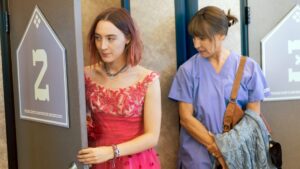Publication Date: 07-20-2023
Lady Bird (2017) review
Dir. Greta Gerwig
By: Steve Pulaski
Rating: ★★★½
Lady Bird clearly comes from a place of empathy and resonance on behalf of its all-star actress-turned-writer/director Greta Gerwig, and that’s one of the many reasons it’s so authentic. Gerwig is an actress I’ve long adored since her collaborative directorial/starring effort Nights and Weekends, where she worked with Joe Swanberg and greeted an unapologetically intimate film for next to no money. On top of that, Gerwig has been the best thing in nearly everything she’s acted in, from Noah Baumbach’s Frances Ha and the followup Mistress America, two films as zippy as she is, to manifesting strong supporting roles in bigger projects like Jackie and 21st Century Women.
Her solo directorial debut in Lady Bird is a phenomenal crowd-pleaser. It’s a familiarly structured coming-of-age story that unearths the unfortunate unfamiliarities many people have with what it means to grow up as a woman. I speak in regards to the fact that due to the abundance of coming-of-age films set around teenage and college-aged males, I’m willing to bet even women know a thing or two about the male psyche thanks to the inundation of similarly plotted comedies and dramas – the problem is that I can’t say the same for men on the opposite subject. Here’s a chance for those women who’ve felt alienated, and perhaps those on the other side of the aisle, to witness something they can laugh with and cheer for – and that’s just what we need right now at the theater.
Lady Bird is a laugh-a-minute, wryly funny movie as it follows a high school senior named Christine McPherson (Brooklyn‘s Saoirse Ronan). She prefers to be addressed as “Lady Bird” and even goes as far as to write it on tests and sign-up forms in school, appropriately encasing it in quotations. Living in Sacramento, a town she cannot stand, attending a Catholic school, with politics she’s weary of, Lady Bird’s closest companion is her friend Julie (Neighbors 2‘s Beanie Feldstein) as she faces a trying decision about what college to attend with spotty family support. While her cash-strapped and soon jobless father (Tracy Letts) is quick to help her with financial aid documents, her mother (Laurie Metcalf) is entirely opposed to her daughter’s dream, which is to leave Sacramento and go to school in New York.
In the meantime, however, Lady Bird gets a part in the school play, forms a relationship with Danny (Lucas Hedges), the play’s cute lead, and navigates the common pitfalls and romances of adolescence. Her sarcastic tone and frequently quirky ways get her in trouble here and there, but her precociousness is enough to make her likable to most she meets – even when they don’t deserve her company as is the case with Kyle (Timothée Chalamet), a pompously cynical (if accurate) high school stereotype.
To compliment its lead character, Gerwig keeps the tone of Lady Bird light-hearted and the pacing largely comprised of vignette-style moments – some even blink-and-you-miss-it quick-cuts. This allows you to remain on your toes for the next craftily edited jump into the future, but because of the lax aura Gerwig maintains, the emotional moments of the film are liable to hit some people like a sucker-punch. During these moments, and there are quite a few, it feels like a bit of life unfolding before our eyes, as everything stops and a reality-check ensues.

Though Gerwig is quick to watch life unfold as it may and for things to be done onto her main character, an indisputable reflection of her younger self, she’s also careful to predicate the film upon the many relationships Lady Bird has in her life. The most significant and complex is the one with her mother, who is contradicting herself by demanding the best from her daughter while condemning her ambitions to go to an elite college. A telling moment in her mother’s caustic side comes out after Lady Bird arrives home late shortly after the news has come that her father lost his job. She screams at her daughter for having her school uniform lying on her bed in a wrinkled mess instead of sitting neatly folded. Lady Bird says something to the effect of sarcastically alluding to the impossibility that, unlike her, her mother must’ve always kept a clean room and her clothes nicely kept. Both know this isn’t true, and in her mother’s eyes, you can tell there’s an awareness she’s being too hard on her daughter, yet pressures and an inability to emote properly all hinder this relationship.
One thing that sadly takes a bit away from the gravity and rawness of Lady Bird and her mother — in one of the film’s only weaknesses — is that there is a bit too much of a focus on Lady Bird’s boyfriends. On one hand, this leads to emotionally revealing moments that involve Lady Bird apologizing to her boyfriend after they have sex: “I’m sorry, I’m just happy,” she says as they lay after the fact in the middle of a warm cuddle. On the other, somewhat repetitive conversations that do little besides highlight the cloying cynicism of Kyle doesn’t do much for Lady Bird’s story except for the fact that hookups, relationships, and confusing “first times” are often highlights in the coming-of-age stories of many girls, not just boys. Gerwig definitely wants to show this, but in doing so, two or three potentially really good scenes involving her and her mother that could’ve strengthened the film’s main emotional arch are missing.
Littering the story are quaintly funny details that recall the absurdity of adolescence, including, but not limited to, when the school’s JV football coach takes over the school play and treats it like a football game, learning the “FOIL” process integral to advanced algebra/trigonometry, and those rote assemblies that try to push an agenda. Many of these moments are complimented by Gerwig’s eye for detail and comic zeal, which makes these otherwise bizarre inclusions that much more palatable and naturally interwoven into the picture.
Adding on, Ronan is so strong as Lady Bird that she has successfully reminded us how capable of a performer she is as her Oscar-nominated role Brooklyn likely has faded from most of our minds. She’s assisted by the likes of assured material from her writer/director, and embodies the sensibilities often found in Gerwig’s performances. Ronan handles heartbreaking scenes very authentically, the witty humor of Gerwig’s sass-crossed-with-quirk effectively, and a cast of veterans around her enhance not only her but Feldstein and Hedges, but not so much so that all three can’t be brought to shine.
Believe the hype: Lady Bird is a charismatic story, hilariously told and elegantly articulated. Its most conflicting attribute for someone like myself, however, who loves seeing Greta Gerwig in front of the camera, fearlessly assuming many audacious roles, is that as great as Gerwig is in front of the camera, perhaps behind the camera is where we need her the most, especially if Lady Bird serves as a “just getting started” baseline for her.
NOTE: My review of Lady Bird on my radio-show Sleepless with Steve on WONC 89.1FM:
OTHER FILMS DIRECTED BY GRETA GERWIG:
My review of Nights and Weekends
My review of Little Women (2019)
My review of Barbie (2023)
Starring: Saoirse Ronan, Laurie Metcalf, Tracy Letts, Beanie Feldstein, Lucas Hedges, and Timothée Chalamet. Directed by: Greta Gerwig.
About Steve Pulaski
Steve Pulaski has been reviewing movies since 2009 for a barrage of different outlets. He graduated North Central College in 2018 and currently works as an on-air radio personality. He also hosts a weekly movie podcast called "Sleepless with Steve," dedicated to film and the film industry, on his YouTube channel. In addition to writing, he's a die-hard Chicago Bears fan and has two cats, appropriately named Siskel and Ebert!


